2 Volumes
Surviving Strands of Quakerism
Of the original thirteen, there were three Quaker colonies, all founded by William Penn: New Jersey first, Pennsylvania biggest, and Delaware so small Quakerism was overcome by indigenous Dutch and Swedes.
The Society of Friends
New volume 2019-05-23 17:20:54 description
Chapter on Quaker Values in Action.
New topic 2018-07-17 20:17:37 description
Silence Connotes Assent: Only To Quakers
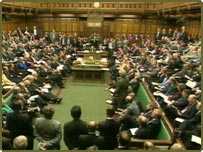
|
| British Parliament |
In 1604, the British Parliament considered the issue of what it should mean if Parliament remained silent on a topic. The English Civil War, King Versus Parliament, was soon to begin, so it was almost inevitable that Parliament would decide that in no sense, no way, was consent to be assumed from its silence. This common law principle endures to the present, and has been explicitly reaffirmed by the U.S. Supreme Court in the past few months. On an even simpler level, what is it to mean if the presiding officer called for the ayes, failed to solicit discussion or nays, and declared the matter settled? That's a fairly common error of inexperienced presiding officers -- and it's a common trick of manipulative partisan presiding officers, too.
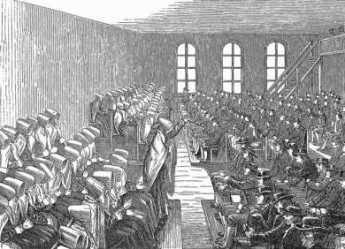
|
| Quaker Meeting for Business |
Parliament soon made the 1604 declaration that if the presiding officer failed to call for the nays, the motion was not carried, no matter how many ayes there appeared to be.
In Quaker Meeting for Business, however, the reverse is true. A proposal is made and discussed until discussion ceases. At that point, some weighty member will announce, "I approve", and usually there will be a chorus of other approves. If there is further silence at that point, the matter is carried and entered into the minutes, which are read aloud for comment and correction, before the meeting adjourns. It's really remarkable how much business can be accomplished in an hour, using that procedure.
The essential difference is that the Quakers are striving for unanimity, while courts and parliaments are striving for a decision. If the issue is whether or not to tax activity or to hang a criminal, it is probably futile to hope for unanimous consent. The stated need here is to come to some judgment, any judgment, in a timely fashion. The Quaker goal is to reach consensus, which may take some members longer than others, but the assumption is that everyone will eventually get to the same point. One group counts votes, with the chairman casting the deciding vote in the event of a tie, while the other group holds a matter over to another meeting until a significant consensus emerges.
The irony of this situation is that a group which sincerely strives for unanimity will actually dispose of its business more quickly than a group which forces the pace to meet some artificial deadline. The Quaker system does break down when the urgency for a decision is greater than the pace of reaching unanimity. The Parliamentary system breaks down when the number of votes (whether a majority or a super-majority) required for a decision, is in fact less than that intangible level of agreement which keeps the organization from disintegrating.
Slavery: If This be done well, What is done evil?
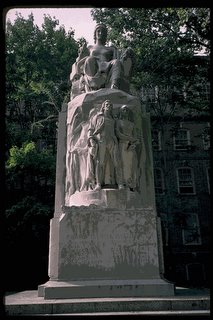
|
| Francis Daniel Pastorius |
The Declaration of the German Friends of Germantown, Against Slavery, in 1688.
These are the reasons why we are against the traffic of men's body, as followeth:
Is there any that would be done or handled in this manner? viz.: to be sold or made a slave for all the time of his life? How fearful and faint-hearted are many at sea, when they see a stranger vessel, being afraid it should be a Turk, and they should be taken, and sold for slaves in Turkey. Now, what is this better done, than Turks do? Yea, rather it is worse for them, which say they are Christians; for we hear that the most part of such negers is brought hither against their will and consent and that many of them are stolen. Now though they are black, we cannot conceive there is more liberty to have them, slaves, as [than] it is to have other white ones. There is a saying , that we shall do to all men like as we will be done [to] ourselves; making no difference of what generation, descent, or color they are. And those who steal or rob men, and those who purchase them, are they not all alike? Here is liberty of conscience, which is right and reasonable; here ought to be likewise liberty of the body, except evil-doers, which is another case. But to bring men hither, or to rob, [steal] and sell them against their will, we stand against. In Europe, there are many oppressed for conscience sake; and here there are those oppressed which are of black color. And we who know others, separating wives from their husbands, and giving them to others: and some sell the children of these poor creatures to other men. Ah! do consider well this thing, you who do it, if you would be done in this manner--and if it is done according to Christianity! You surpass Holland and Germany in this thing. This makes an ill report in all those countries of Europe when they hear of [it,] that the Quakers do here handler men as they handle there the cattle. And for that reason, some have no mind or inclination to come hither. And who shall maintain this your cause, or plead for it? Truly, we cannot do so, except you shall inform us better hereof, viz,: That Christians have liberty to practice these things, Pray, what thing in the world can be done worse, towards us, than if men should rob or steal us away, and sell us for slaves to strange countries; separating husbands from their wives and children. Being now this is not done in the manner we would be done at, [by]; therefore, we contradict [oppose], and are against this traffic of men's body. And we who profess that it is not lawful to steal, must, likewise, avoid purchasing such things as are stolen, but rather help to stop this robbing and stealing, if possible. And such men ought to be delivered out of the hands of the robbers, and set free as in Europe. Then is Pennsylvania to have a good report, instead, it hath now a bad one, for this sake, in other countries. Especially whereas the Europeans are desirous to know in what manner the Quakers do rule in their province; and most of them do look upon us with an envious eye. But if this is done well, what shall we say is done evil?
If once these slaves ( which they say are so wicked and stubborn men,) should join themselves--fight for their freedom, and handle their masters and mistresses, as they did handle them before; will these masters and mistresses take the sword at hand and war against these poor slaves, like, as we are able to believe, some will not refuse to do? Or, have these poor negers not as much right to fight for their freedom, as you have to keep them slaves?
Now consider well this thing, if it is good or bad. And in case you find it to be good to handle these blacks in that manner, we desire and require you hereby lovingly, that may inform us herein, which at this time never was done, viz., that Christians have such a liberty to do so. To this end, we shall be satisfied on this point, and satisfy likewise our good friends and acquaintances in our native country, to whom it is a terror, or fearful thing, that men should be handled so in Pennsylvania.
This is from our meeting at Germantown, held ye 18th of the 2nd month, 1668, to be delivered to the monthly meeting at Richard Worrell's.
Garret Henderich
Derick op de Graeff
Francis Daniel Pastorius
Abram op de Graeff.***
At our Monthly meeting, at Dublin, ye 30th 2d mo., 1688, we have inspected ye matter, above mentioned, and considered of it, we find it so weighty that we think it not expedient for us to meddle with it here, but do rather commit it to ye consideration of ye quarterly meeting; ye tenor of it is related to ye truth.On behalf of ye monthly meeting,
Jo. Hart.
***
This above mentioned was read in our quarterly meeting, at Philadelphia, the 4th of ye 4th mo., '88, and was from thence recommended to the yearly meeting, and the above said Derick, and the other two mentioned therein, to present the same to ye above said meetings, it is a thing of too great a weight for this meeting to determine.Signed by order of ye meeting.
Anthony Morris
The Walking Purchase
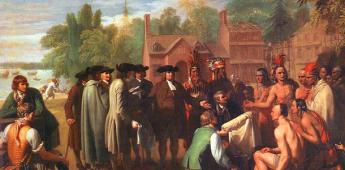
|
| William Penn and the Indians |
Any fair discussion of Quaker relations with the Indians must emphasize that almost all other colonists of the time regarded Indians as subhuman components of the local wilderness. Only William Penn was careful to treat the Indians as fellow human beings, entitled to fair play, dignity, and respect. Like a good politician, he entered into their games with enthusiasm and definitely earned their respect by outdoing them all in the broad jump contests. Even though he had bought the land from King Charles II, he took care to buy it a second time from the Indians, and for many decades was able to enforce the wise rule of never permitting settlers on the land before the Indians agreed to its purchase. After Penn's death, however, and particularly from 1726 to 1736, a major wave of German and Scotch-Irish immigration created an overwhelming population pressure on the seaboard areas, resulting in much unauthorized pioneering and settlement. Since William Penn spent only a few years in the colonies his agents chiefly James Logan, had long set the tone.
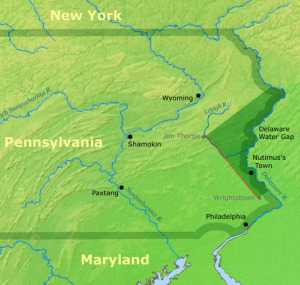
|
| Walking Purchase |
Logan had been equally famous for his many efforts to treat the Indians fairly, and the grounds of Stenton, his manor house, were often filled with Indians come to pay their respects. Against all this evidence of the benign attitudes of both Penn and Logan, there stands the episode of the Walking Purchase of 1737. No doubt about it, the Indians were treated badly.
In the triangle between the Neshaminy Creek and the Delaware River, the Delaware Indians agreed to a sale with the third side of the triangle established at a distance from Wrightstown, as far as a man could walk northward toward the Wind Gap in a day and a half. That was a common form of boundary for Indian land sales, and its distance was fairly well understood. In anticipation of pacing out the distance, the colonists sent out explorers to find the easiest path, then sent out woodsmen to clear a path in the forest, and selected three of the fastest runners in the colony to do the running. The pace was so fast that two of the runners had to drop out, and the third one nearly did so. The resulting boundary was nearly twice as far into the wilderness as was commonly accepted for the measurement, taking advantage of the sharp bend in the river which widened the land in question by a great deal. The Indians were so disgusted they refused to leave the territory. Logan had already made an agreement with the Iroquois nation, to whom the Delawares were subject, and the Delawares only surrendered the land when the Iroquois began to look as though they really would act as enforcers for the bargain. Although serious Indian warfare did not break out for another twenty years, the Walking Purchase went a long way toward convincing the Delaware tribe that the Quakers were no more trustworthy than the settlers in other colonies, and is said to have been on their minds when twenty years later they helped the French decimate General Braddock's army.
There will probably never be a clear resolution of the paradox of Quakers, particularly Logan, behaving in this reprehensible manner within a very long history of the unusually honorable treatment of the Indians. With William Penn now dead and gone, no doubt Logan was caught in a squeeze between the two rather dissolute sons of William Penn, neither of them Quaker, who had over-indebted themselves with high living and were pressing their agent to make land sales to pay for it. Then there was the pressure of the new German and Scotch-Irish immigrants, brought to the New World by real estate promises, and stranded in the seaport unable to complete their land purchases. Under this pressure, Logan may have been unduly persuaded that the 1684 treaties with the Indians, along with many other treaties and understandings, were all the legal justification he needed. Whatever the specifics of the situation at the time, it is now clear the Walking Purchase was a blot on the Quaker record that can never be entirely justified within the Quakers' own standards of fairness. Within the Society of Friends, whatever other English colonists might have done in their position, let alone what French and Spanish regularly did to the Indians, doesn't matter in the slightest.
Politics of the French and Indian War
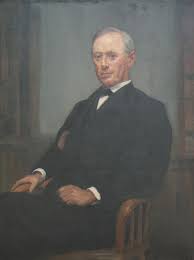
|
| Isaac Sharpless |
In the European view, the French and Indian War was a mere skirmish in the many-year conflict between France and England. But the Atlantic is a wide ocean. The local Pennsylvania politics of that war concern the land-hungry settlers striving for Indian lands, the Quaker Assembly doing its best to maintain William Penn's formula for peace ("No settlements without first buying the land from the Indians."), and William Penn's far-from-idealistic Anglican sons, focused on profit from a land rush. Western Pennsylvania belonged to the Delaware tribe, but the Delawares were subject to the Iroquois nation. The year is 1754. The following pro-Quaker description is given by Isaac Sharpless, president of the Quaker Haverford College between 1887 and 1917 (Political Leaders of Colonial Pennsylvania,
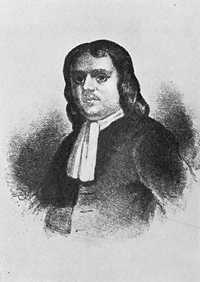
|
| Isaac Norris |
Isaac Norris was appointed to another Albany treaty with the Indians in 1754. The commission consisted of John Penn and Richard Peters representing the Proprietors, and Benjamin Franklin and himself, the Assembly. Indian relations were becoming difficult. The Five Nations still claimed the right to the ownership of Pennsylvania and insisted that no sale of land by the Delawares was permissible. In an evil hour, the government of Pennsylvania recognized this claim and this Albany meeting was for the purpose of effecting a purchase. By methods that were more or less unfair, taking advantage of the Indian ignorance of geography, they bought for 400 pounds all of southwestern Pennsylvania. When the Delawares found their land had been sold without their consent, they threw off the Iroquois yoke, joined the French, defeated Braddock's army a year later and for the first time in the history of the Colony the horrors of Indian warfare were known on the frontiers.
Although Sharpless goes directly to the unvarnished truth of the situation, he reveals the depth of his bitterness by openly discarding Franklin's cover story about being in Albany to propose political unity among the British colonies.
It was on this expedition that Franklin presented to his fellow delegates his plan for a union of the Colonies, of course in subordination to the British Crown which was a precursor of the final union in Revolutionary days. Sixty years earlier William Penn had proposed a somewhat similar scheme.
The war came, French intrigue and the unwisdom of the Executive branch of the government of the Province (the Penns) drove the Indians, who for seventy-three years had been friendly, into the warpath. Cries came in from the frontiers of homesteads burnt, men shot at their plows, women, and children scalped or carried into horrible captivity, and a growing sentiment among the red men that the French were the stronger and that the English were to be driven into the sea.
Pennsylvania Prison Society
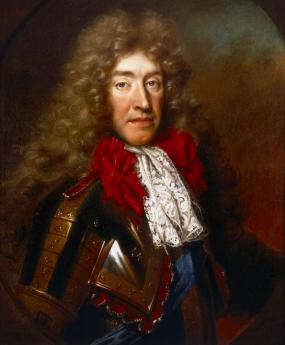
|
| Duke of York |
William Penn, who spent considerable time in British prisons, established a penal code for his new colony which largely swept away the draconian punishments established by the code of the Duke of York. Until as late as 1780, jails were mainly confinement hotels for debtors, prisoners awaiting trial, and witnesses. For actual punishment, the methods were execution and flogging. Penn's Code for Pennsylvania restricted execution to the crime of murder, and flogging to sexual offenses; everything else was punished by fines and imprisonment. Hidden in this code, of course, was the need to invent and construct prisons to service the imprisonment. It would take over a century to address this need, and Philadelphia still has not completely caught up with the need for more prison cells. Without a prison system, the Penn code was impractical, and the colonial penal code retrogressed toward floggings, pillories, and hangings after Penn's death.
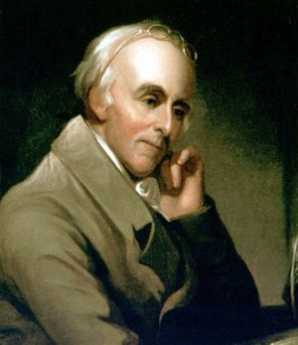
|
| Dr. Benjamin Rush |
In colonial Philadelphia, the main prison was on Walnut Street, with sixteen cells. A neighboring Quaker, Richard Wistar, started a soup kitchen in his own home, taking the soup over to prisoners. By 1773, he had established the Pennsylvania Society for Assisting Distressed Prisoners, which was unfortunately disbanded by the occupying British Army in 1777. In 1783, Dr. Benjamin Rush with the assistance of Benjamin Franklin, Bishop White, and the Vaux family, founded the Philadelphia Society for Alleviating the Miseries of Public Prisons, which after a century changed its name to the Pennsylvania Prison Society. The Prison Society believes it is the oldest continuous non-profit society in America.
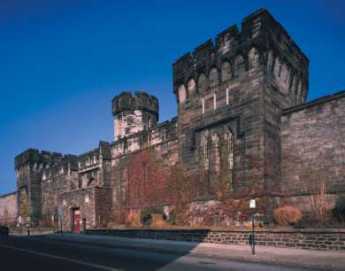
|
| Eastern State Penitentiary |
The Prison Society has had several major changes in direction. The original concept was to substitute public labor for imprisonment, a less costly arrangement than imprisonment while avoiding a return to floggings and dismemberment. However, the degrading sight of prisoners in chain gangs caused a public outcry, and the approach was abandoned. In the spirit of the French and American revolutions, loss of liberty was seen as the greatest punishment conceivable. Added to this was the Quaker concept of inspiring remorse through silent meditation, and the eventual outcome was the construction of the Eastern State Penitentiary on what was then called Cherry Hill. In 1823, it was ominous that Eastern State Penitentiary was the largest structure in America. Although the concept was widely admired and imitated, the prolix Charles Dickens took a violent dislike to the idea of never talking to anyone, and led a reversion away from penitentiaries back to simple prisons. In the days before Alzheimers and schizophrenia were well characterized, the spectacle of massive recidivism was added to the rumor that protracted solitude led to insanity.

|
| Catherine Wise |
From Catherine Wise the Communications Director of the Pennsylvania Prison Society, the Right Angle Club recently learned that the current evolution of the American penal system has led to a steady state, but a troubled one. There are 2.2 million inmates in American prisons today, more than any other nation including Russia and China. Of these, 75,000 are confined in Pennsylvania, 9,000 in Philadelphia. Recidivism is 67%, the cost is $31,000 per year per inmate, the majority of inmates have been involved with illicit drugs, a growing number are infected with HIV and Hepatitis C, mental illness runs around 20%. The cost of incarceration is growing faster than the cost of either education or healthcare for the community. Prison overcrowding is extremely serious, the programs for managing parole and integration back into society are weak and underfunded. Eighty percent of the inmates are non-white, most prisons are located in remote regions too far for easy visiting, medical care in prison would not seem at all acceptable in general society. The Prison Society has no difficulty finding projects which are urgently needed. Just for an example, take the peculiar prison statistics; it really seems improbable that only 9,000 of the 75,000 Pennsylvania prisoners are in Philadelphia. Then reflect, NIMBY, that no one wants a prison or its visitors near his home, except areas of rural poverty welcome the employment a prison brings. Reflect for a moment that "jails" are paid for by local county taxes and contain prisoners with less than two years to serve. "Prisons" are paid for with state taxes, and contain those sentenced to longer than two years. Finally, add the fact that nonvoting Philadelphia prisoners in rural prisons are counted by the census as residents of the rural area for the purpose of distributing legislative and congressional seats. The rural politicians love the system, the urban neighbors love to be rid of the prison environment, but the prisoner families can't visit the prisoner. Who cares? Who even notices?
During the first World War, Quaker interest in prison matters was greatly stimulated by the imprisonment of many Quaker conscientious objectors to the wartime draft; since that time prison conditions have again become a central interest of the religion. It's hard to prove but is confidently asserted, that violence and mistreatment of prisoners are appreciably less in Pennsylvania than the rest of the country, California for example. In any event, The Pennsylvania Prison Society is a particularly effective advocate for humane treatment because of credibility achieved over two centuries, with newspaper editors on its board, and sympathetic affiliations with the legislative judicial committees. It knows what it is talking about, as a result of over 5000 annual prison visitations, and it has served the prison administrative corps by performing volunteer work, accepting contracts for parole projects, arranging bus trips for prisoner families to remote prisons, and working for improved funding for prisons. At the moment, there are six highly imaginative bills before the Pennsylvania Legislature, devised and researched by this outside organization with credibility, and political clout. Although the Society takes an occasional contract for a project, it is itself entirely funded by outside contributions, and because of occasional adversarial situations, asks for no funds from the state. Even the contract funds have been questioned, and are only accepted when the working relationships fostered are more useful for the prisoner clients than any co-option which might result.
One final word about medical care in prison. It's not as good as medical care for non-prisoners, and unfortunately it probably never can be. The remote rural location of prisons makes it difficult to obtain physicians and nurses, regardless of wage levels. It's dangerous to be around prisoners, as any guard will tell you, and it's more dangerous to be in control of narcotics amidst a population of addicted convicts. Malingering is nearly universal, both to obtain desired drugs and to spend "easy time" in the infirmary. Many prison escapes are engineered around the necessarily weakened security of the medical system. The prison budgeting system has all the rigidity and weaknesses of any governmental medical system, and in this case, it's run far out of sight of the public. Even the bureaucrats in charge are victimized by other bureaucrats. The average duration of incarceration in Pennsylvania is longer than in most other states; the prisons have to keep mental patients because the mental hospitals have all been closed. Fifty years ago, when there was no place to put a non-criminal with tuberculosis, he was put in jail. The parole system is underfunded, there is not nearly enough community support to absorb ex-con. Behind all this is a shortage of prison facilities. The legislature has got itself into a position that if it moved more prisoners into the outside, more prisoners would just fill the vacancies, costs would go up, and things wouldn't look much better. Only after the backlogs have been absorbed, would there be much visible effect.
Quakers and Indians
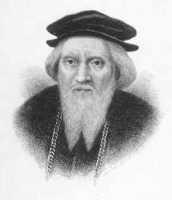
|
| John Cabot |
The concept of paganism was even extended to Protestant sects. Henry VII of England was given ownership rights to the rest of the undiscovered Western Hemisphere when John Cabot explored the coast of North America. Although matters were clouded somewhat when Henry VIII separated England from the Catholic Church, the principle of conferring undiscovered land to the first discoverer was continued under Protestant rule, and continued to include the proviso that there must be no Christian settlement if the land was to be claimed by a discoverer. This was a central element of the dispute between Lord Baltimore and William Penn over the ownership of what is now the State of Delaware. Penn acquired title to this area from the Duke of York, who had taken it from the Dutch. The argument went on for years as to whether wandering Dutch fur traders counted as Christian settlers, and therefore whether the Duke of York's title took precedence over the earlier grant of land south of the 40th parallel, given to the first Lord Baltimore by the first King Charles. What all these silly wrangles seem to prove is that ownership of land has always been a difficult and vague concept, filled with unfairness and judicial experience. The change from feudal, nomadic culture to a fixed agricultural one required that rules of ownership must be devised and held to, even though the logic and justice of them was rather easily challenged. One of the main functions of the modern state is to minimize and permanently settle boundary disputes, often with no sensible basis to work with.
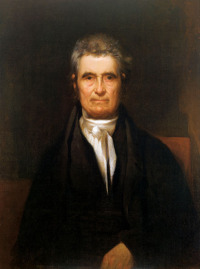
|
| Chief Justice John Marshall |
In the United States, the creation of an entirely new nation by the forcible defeat of the previous British owners became a settled matter at the Treaty of Paris in 1783. The United States owned the land within its boundaries and was within its rights to redefine or reassign property as it pleased. The fine details of relations with the native tribes were settled in 1823 by the decision of Chief Justice John Marshall in Johnson v. M'Intosh. Marshall made the clear pronouncement that the tribes lost their sovereignty at the moment of discovery. However, his meaning is less clear when he went on to say the tribes had a right of occupancy, but not a right of ownership. The passage of two hundred years under this legal concept has created a legal situation of stare decisis and a practical problem that judicial questioning of the authenticity of millions of land titles after this long interval would bring the nation close to armed rebellion.
There is also a problem pointed out by the historian Edmond Morris, that after all these years we may not entirely understand the problem we are dealing with. Although there are individual exceptions, particularly in the Quaker states and Oklahoma, there are no documented instances of any Indian tribe being assimilated. There are literally hundreds of Indian languages, reflecting tribal differences as wide as between the Aztecs and the Esquimos. And attempts to assimilate have been as varied as the Spanish attempting slavery, the French favoring intermarriage, the English trying boarding schools for Indian children. But in five hundred years of colonization, the amount of assimilation has been trivial. Even the discovery of oil and the establishment of gambling casinos have created pockets of real wealth among the native Americans without any great sign of a willingness to assimilate. Looking backward, it would appear that five hundred years of experience were based on the assumption that the Indians would surely see the superiority of our culture, and wish to adopt it. For reasons no one understands, that premise does not seem to be correct and is certainly an arrogant one. But North America is now largely settled from ocean to ocean; to go back to dual existence, dual cultures in the school system, dual legal systems intermingled -- and dual sovereignty -- does not have the sound of a practical, peaceful solution to what is clearly a mixture of injustice and blundering.
Quakers From the Indian Point of View
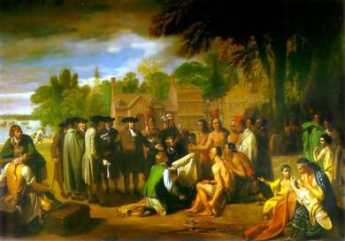
|
| William Penna and Indians |
The following property of the Nicholson family has been presented to the Haddonfield Friends Meeting in replica form. Although signed by John Haines, it is not readily apparent why this member of a very old New Jersey Quaker family was being addressed, just what it means that he signed it, or possibly whether John Haines was a name adopted by Corn Planter. Very likely, however, Haines was acting as public scribe, a common profession in all illiterate societies. As a matter of fact, there have been so many Joseph Nicholsons that it takes some tracing to identify just which one he was, too.
------------- To the Children of the friends of Onas, who first settled in Pennsylvania:
The request of the Corn Planter a Chief of the Seneca Nation --
Brothers, The Seneca Nation see, that the greater Spirit intends that they shall not continue to live by hunting, and they look round on every side and inquire who it is that shall teach them what is best for them to do. Your fathers have dealt fairly and honestly with our fathers, and they have charged us to remember it and we think it right to tell you, that we wish our Children to be taught the same principles by which your Fathers were guided in their Councils.
NicholsonsBrothers, We have too Little wisdom among us, we cannot teach our Children what we perceive their situation requires them to know, and we, therefore, ask you to instruct some of them -- we wish them to be instructed to read and to write and such other things as you teach your own Children, and especially to teach them to love peace.
Brothers, We desire of you to take under your care two Seneca boys and teach them as your own, and in order that they may be satisfied to remain with you and be easy in their minds that you will take with them the son of our interpreter and teach him also according to his desire.
Brothers, You know that it is not in our power to pay you for the education of these three boys, and therefore you must, if you do this thing look up to God for your reward.
Brothers, You will consider this request, and let us know what you determine to do -- If your Hearts are inclined toward us, and you will afford our Nation this great advantage, I will send my son as one of the boys to receive your instruction and at the time which you shall appoint.
Signed February 10. 1791 -- in the presence of Joseph Nicholson
his Corn X Planter Mark
John Haines
Quaker Gray Turns Quaker Green
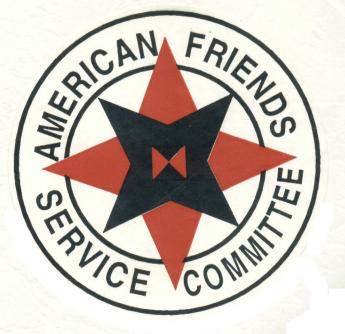
|
| American Friends Service Committee Logo |
Miriam Fisher Schaefer, at one time the Chief Financial Officer of the American Friends Service Committee, had to cope with the economics of renovating the business headquarters complex for various central Quaker organizations. They're housed in a red-brick building complex, naturally, located on North 15th Street right next to the Municipal Services Building of the Philadelphia City Hall complex. The original building within the complex is the Race Street Meetinghouse, funds for which were originally raised by Lucretia Mott. The Quakers needed to expand and renovate their offices, a nine million dollar project. Miriam, a CPA, calculated that the job could be made completely environment-friendly for an extra $3 million. The extra 25% construction cost explains why very few buildings are as energy-efficient as they easily could be. However, in the long run, a "green" building eventually proves to be considerably cheaper. Not only would a green Quaker headquarters be a highly visible "witness" to environmental improvement, but it would also pay for itself in reduced expenses after about eight years. That is, if friends of the environment would provide $3 million in after-tax contributions, they would provide a highly visible example to the world, and reduce the running expenses of the Quaker center by a quarter of a million a year, indefinitely. Effectively, this is a charitable donation with a permanent tax-free investment return of 12%, quite nicely within the Quaker tradition of doing well while doing good.
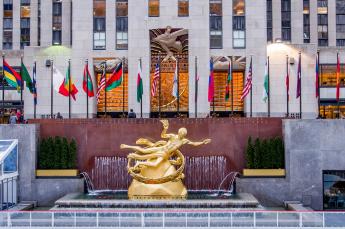
|
| Rockefeller Center |
Energy efficiency isn't one big thing, it is a lot of little things. If you dig a well deep enough, its water will have a temperature of 55 degrees, and only require heating up another 15 degrees to be comfortable in winter, or cooling down thirty degrees to be comfortable in the summer; that's described as a heat pump. Then, if you plant sedum, a hardy desert succulent plant, on the roof it will insulate the building, slow down rainwater runoff, and probably never have to be replaced. Rockefeller Center, you might be interested to learn, has a "green roof" of this sort, which has so far lasted seventy years without replacement. The Race Street Meetinghouse was built in 1854 and has so far had many roof replacements, each of which created a minor financial crisis when the need suddenly arose.
The ecology preservation movement is full of other great ideas for city buildings because buildings --through their heating, ventilating and air conditioning -- contribute more carbon pollution to the atmosphere than cars do. For another example, fifty percent of the contents of landfills originate in dumpsters taking construction trash away from building sites. What mainly stands in the way of more recycling of such trash is the extra expense of sorting out the ingredients. Catching rainwater runoff allows its reuse in toilets, eliminating the need to chlorinate it, meter it, and transport it from the rivers. And so forth; you can expect to hear about this sort of thing with great regularity now that the Quakers have got stirred up. You could save a lot of air conditioning cost by painting your roof white. At first, that would look funny. But do you suppose oddness would bother the Society of Friends for one instant? No, and you can expect them to make it popular, in time. People at first generally hate to look funny, but with the passage of time they grow to like looking intelligent.
A lot of people want to save the planet. So do the Quakers, but they have come to the view that the public is more easily persuaded to save money.
Settlement Music School
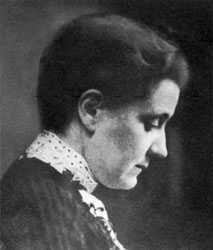
|
| Jane Adams |
The Settlement Music School has six branches, fifteen thousand current students, an $8 million budget, and three hundred thousand alumni. It tells you something about Philadelphia that an organization this large can exist for 98 years, and yet remain almost invisible. So let's tell a few things about it.
The settlement movement began in England around 1880, and was brought to America by a Quaker lady named Jane Addams. Her most famous settlement was called Hull House, in Chicago. Jane Addams seconded the nomination of Theodore Roosevelt at the Progressive Party convention, and was active in the formation of National Association for the Advancement of Colored People, as well as the American Civil Liberties Union. She was a prominent suffragette, and as a Quaker, it might be expected that she was an outspoken pacifist. Remember, what we are talking about here is music.

|
| tenement districts |
Settlements were what nice upper-class ladies called the tenement districts, and a settlement House was a center for activist women to go help the immigrant groups typically found there. Since there is obviously a lot of difference in what needs to be done to help recent ex-slaves, Italian and Jewish immigrants, and all the different ethnic clusters, the Settlement movement is an archipelago of very different forms of social work. One of the ways to appeal to different groups is through the teaching of music, and the teaching on expensive bulky instruments like pianos is quite naturally shared in a school building. While it is true that a couple of Settlement students are admitted to the musical big time at Curtis Institute every year, only a small proportion of Settlement students go on to musical careers. The three most famous musical alumni of the Philadelphia Settlement Music School were Chubby Checker, who invented a dance called the Twist, Albert Einstein. who played the violin in various chamber groups, and former Mayor Frank Rizzo, who learned to play the clarinet.
The mission of the Settlement School has gradually become the spreading of musical appreciation, especially among "the masses", and it measures its success in the size of its audiences rather than by occupying the center of the stage. This function is readily thrust off on them by the eagerness of public school boards to cut expenses, although the School is scarcely in a financial position to go all the way and assume the role of teaching music classes to 250 public schools. Nevertheless, when financial stringency forces the school board to cut expenses, their choice between a music teacher and a football coach is no choice at all. At that moment, a free-standing music appreciation school ceases to be a competitor and becomes a safety valve. When you hear the Settlement School is in need of money, you are likely being told about stringency in the public school budget.
Although the tuition is quite inexpensive for a music school, the students collectively contribute about half of the annual budget. The rest comes mostly from private charity. You really can't expect cutting edge innovation from school children or endowed charities. But somehow this school leaves you with an impression of big missed opportunity in the truly American forms of music like jazz and folk singing. Symphony orchestra was invented in Vienna and flourishes there, so it has a faintly foreign air to it. It's not completely surprising that both the sponsors and the subjects of Americanization for the Slums are hesitant to promote symphonic role models, while the sponsors at least are a little lost in the world of Rock. Not surprising, but something of a pity.
9 Blogs
Silence Connotes Assent: Only To Quakers
 Quakers seek consensus, but try not to be intimidated by it. You get a lot accomplished at a meeting where agreement is assumed unless disagreement is voiced.
Quakers seek consensus, but try not to be intimidated by it. You get a lot accomplished at a meeting where agreement is assumed unless disagreement is voiced.
Slavery: If This be done well, What is done evil?
 Philadelphia German Quakers were the first to protest the evils of slavery.
Philadelphia German Quakers were the first to protest the evils of slavery.
The Walking Purchase
 Quaker treatment of the Indians had been exemplary before 1737 and has been highly sympathetic ever since then, too. However, James Logan totally destroyed the trust of the Delaware Indians by using hired runners to establish boundaries of the Walking Purchase, north of the Neshaminy Creek.
Quaker treatment of the Indians had been exemplary before 1737 and has been highly sympathetic ever since then, too. However, James Logan totally destroyed the trust of the Delaware Indians by using hired runners to establish boundaries of the Walking Purchase, north of the Neshaminy Creek.
Politics of the French and Indian War
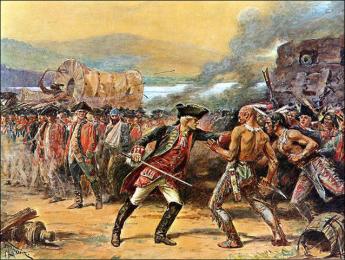
Pennsylvania Prison Society
 When the British monarchy put William Penn in jail, they set in motion a social movement which has changed prison management more than it changed Penn.
When the British monarchy put William Penn in jail, they set in motion a social movement which has changed prison management more than it changed Penn.
Quakers and Indians
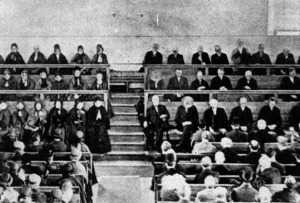 The Philadelphia Yearly Meeting of Friends has voted to endorse the U.N. Declaration on the Rights of Indigenous Peoples. The United States delegation to the U. N. has declined to endorse it. Each side has a point worth considering.
The Philadelphia Yearly Meeting of Friends has voted to endorse the U.N. Declaration on the Rights of Indigenous Peoples. The United States delegation to the U. N. has declined to endorse it. Each side has a point worth considering.
Quakers From the Indian Point of View
 The Iroquois were fierce warriors, but they could see they would need better education to survive in a new world.
The Iroquois were fierce warriors, but they could see they would need better education to survive in a new world.
Quaker Gray Turns Quaker Green
 Quakers mean to turn their headquarters near Philadelphia City Hall into a glowing example of how to save money while they save their environment.
Quakers mean to turn their headquarters near Philadelphia City Hall into a glowing example of how to save money while they save their environment.
Settlement Music School
 Without much notice, fifteen thousand music students attend six branches of a school with connections to the NAACP, ACLU, and the Bull Moose Party.
Without much notice, fifteen thousand music students attend six branches of a school with connections to the NAACP, ACLU, and the Bull Moose Party.